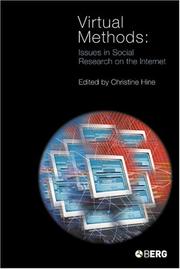| Listing 1 - 10 of 13 | << page >> |
Sort by
|
Book
ISBN: 9780857855046 0857855042 9780857855701 0857855700 0857855425 9780857855428 0857857630 1474218903 1003085342 100018966X 1000183033 9781003085348 9781000186277 100018627X 9781000189667 9781000183030 9781474218900 9780857857637 9780857857637 Year: 2015 Publisher: London: Bloomsbury academic,
Abstract | Keywords | Export | Availability | Bookmark
 Loading...
Loading...Choose an application
- Reference Manager
- EndNote
- RefWorks (Direct export to RefWorks)
"The internet has become embedded into our daily lives, no longer an esoteric phenomenon, but instead an unremarkable way of carrying out our interactions with one another. Online and offline are interwoven in everyday experience. Using the internet has become accepted as a way of being present in the world, rather than a means of accessing some discrete virtual domain. Ethnographers of these contemporary internet-infused societies consequently find themselves facing serious methodological dilemmas: where should they go, what should they do there and how can they acquire robust knowledge about what people do in, through and with the internet? This book presents an overview of the challenges faced by ethnographers who wish to understand activities that involve the internet. Suitable for both new and experienced ethnographers, it explores both methodological principles and practical strategies for coming to terms with the definition of field sites, the connections between online and offline and the changing nature of embodied experience. Examples are drawn from a wide range of settings, including ethnographies of scientific institutions, television and social media, and locally-based gift-giving networks."--
Internet --- Internautes --- Ethnologie --- Aspect social --- Recherche --- Méthodologie --- Internet users. --- Ethnology --- #SBIB:39A2 --- Web users --- World Wide Web users --- Computer users --- Personal Internet use in the workplace --- Social aspects. --- Research --- Methodology. --- Antropologie: methoden en technieken --- Social aspects --- Internautes. --- Aspect social. --- Recherche. --- Méthodologie. --- Ethnology. --- Internet users --- Cultural anthropology --- Ethnography --- Races of man --- Social anthropology --- Anthropology --- Human beings --- Research&delete& --- Methodology --- Internet - Social aspects

ISBN: 1845200853 1845200845 9781845200855 Year: 2005 Publisher: Oxford Berg
Abstract | Keywords | Export | Availability | Bookmark
 Loading...
Loading...Choose an application
- Reference Manager
- EndNote
- RefWorks (Direct export to RefWorks)
#SBIB:303H32 --- #SBIB:303H14 --- #SBIB:303H4 --- Waarneming en participerende waarneming, gecontroleerde observatie, groepsdiscussie (vragenlijsten, interviews, experimenten) --- Methoden en technieken van de communicatiewetenschap --- Informatica in de sociale wetenschappen --- Internet research. --- Internet dans la recherche --- Internet -- Social aspects. --- Computer. Automation --- Methods in social research (general) --- Internet --- Computer networks. --- Social interaction. --- Réseaux d'ordinateurs --- Interaction sociale --- Social aspects. --- Aspect social --- Computer networks --- Internet research --- Social interaction --- Human interaction --- Interaction, Social --- Symbolic interaction --- Exchange theory (Sociology) --- Psychology --- Social psychology --- Web research --- Research --- Communication systems, Computer --- Computer communication systems --- Data networks, Computer --- ECNs (Electronic communication networks) --- Electronic communication networks --- Networks, Computer --- Teleprocessing networks --- Data transmission systems --- Digital communications --- Electronic systems --- Information networks --- Telecommunication --- Cyberinfrastructure --- Electronic data processing --- Network computers --- Social aspects --- Methodology --- Distributed processing --- Recherche sur Internet --- Réseaux d'ordinateurs. --- Interaction sociale. --- Aspect social. --- Réseaux d'ordinateurs.

ISBN: 0761958967 0761958959 0857020277 9786611240318 1446229637 1281240311 1847876498 9780761958956 Year: 2003 Publisher: London: Sage,
Abstract | Keywords | Export | Availability | Bookmark
 Loading...
Loading...Choose an application
- Reference Manager
- EndNote
- RefWorks (Direct export to RefWorks)
Computer architecture. Operating systems --- Sociology of culture --- #KVHA:Etnografie --- Internet --- Social aspects. --- #SBIB:309H103 --- #SBIB:309H1713 --- Social aspects --- Mediatechnologie / ICT / digitale media: sociale en culturele aspecten --- Mediatechnologie: nieuwe toepassingen (abonnee-televisie, electronic mail, desk top publishing, virtuele realiteit...) --- --Aspects sociaux --- --Social aspects --- Internet - Social aspects --- Aspects sociaux --- INTERNET --- ETHNOLOGIE --- ANTHROPOLOGIE DE L'IMAGE --- SOCIOLOGIE DE L'IMAGE --- ASPECTS SOCIAUX --- METHODOLOGIE

ISBN: 1282099345 9786612099342 0262275406 1435628365 0262263181 9780262275408 9781435628366 9781282099340 9780262083713 026208371X 9780262263184 6612099348 Year: 2008 Publisher: Cambridge, Mass. : MIT Press,
Abstract | Keywords | Export | Availability | Bookmark
 Loading...
Loading...Choose an application
- Reference Manager
- EndNote
- RefWorks (Direct export to RefWorks)
For all the use scientists make of computers in their work, we still know little about how computing affects their working methods and the knowledge they produce. Christine Hine explores these questions by examining the developing use of information technology in one discipline, systematics (the classification of organisims).
Biology --- Information storage and retrieval systems --- Data processing. --- Biology. --- Biological literature searching --- Biological libraries --- Life sciences --- Biomass --- Life (Biology) --- Natural history --- SCIENCE, TECHNOLOGY & SOCIETY/General --- INFORMATION SCIENCE/General --- Biologie --- Systèmes d'information. --- Informatique. --- Sciences naturelles --- Classification
Book
ISBN: 0199793891 9780199793891 Year: 2013 Publisher: Oxford: Oxford university press,
Abstract | Keywords | Export | Availability | Bookmark
 Loading...
Loading...Choose an application
- Reference Manager
- EndNote
- RefWorks (Direct export to RefWorks)
Sociology --- Social sciences --- Qualitative research --- Internet --- Report writing
Book
ISBN: 9780761958963 Year: 2000 Publisher: London ; Thousand Oaks, Calif. : SAGE,
Abstract | Keywords | Export | Availability | Bookmark
 Loading...
Loading...Choose an application
- Reference Manager
- EndNote
- RefWorks (Direct export to RefWorks)
Internet --- Communication --- Mass media and culture --- Technologies de l'information et de la communication --- Médias et culture --- Social aspects. --- Technological innovations --- Social aspects --- Aspect social
Book
ISBN: 9780857020277 Year: 2000 Publisher: London : SAGE,
Abstract | Keywords | Export | Availability | Bookmark
 Loading...
Loading...Choose an application
- Reference Manager
- EndNote
- RefWorks (Direct export to RefWorks)
Christine Hine rejects the postmodernist reading of the Internet as a site for playfulness and the end of authenticity. She argues that the Internet is both a site for cultural formations and a cultural artefact.
Book
ISBN: 9780198860679 9780198860686 0192604791 0198860684 0198860676 019189267X 0192604783 Year: 2021 Publisher: New-York (N.Y.): Oxford university press,
Abstract | Keywords | Export | Availability | Bookmark
 Loading...
Loading...Choose an application
- Reference Manager
- EndNote
- RefWorks (Direct export to RefWorks)
"Digital work is organizationally, interpretively, spatially and temporally complex. An array of innovative methodologies have begun to emerge to capture these activities, whether through re-purposing existing tools, devising entirely novel methods or mixing old and new. This book brings together some of these techniques in one volume as a sourcebook for management, business, organizational and work researchers pursuing projects in this field. The specific objectives of this book are to: present a range of innovative methods which capture and analyse digitally-related work practices through reflexive accounts of real world research projects; provide an accessible sourcebook of these methods for the business and management research community; elucidate the range of challenges such methods may raise for research practice, outlining debates and recommendations; and provide further reading and information to support research practice. The book is organised in four sections that reflect researchers' different areas of focus and methodological approaches: working with screens; digital working practices; distributed work and organizing; and digital traces of work. Each chapter provides a reflexive account of researchers' own experiences in developing methods that capture digital aspects of work and organization. We conclude by reflecting on the future of research given the current intensification of digital work during a global pandemic that is impacting all aspects of our lives"--
Telecommuting --- Home labor --- Research --- Methodology. --- Telecommuting - Research - Methodology --- Home labor - Research - Methodology --- Telecommuting. --- Telework --- Teleworking --- Flexible work arrangements --- Telematics --- Commuting --- Telecommunication --- Methods in social research (general) --- Sociology of work
Book
ISBN: 1137453656 1349558621 1137453664 Year: 2016 Publisher: London : Palgrave Macmillan UK : Imprint: Palgrave Macmillan,
Abstract | Keywords | Export | Availability | Bookmark
 Loading...
Loading...Choose an application
- Reference Manager
- EndNote
- RefWorks (Direct export to RefWorks)
This timely book inspires researchers to deploy relevant, effective, innovative digital methods. It explores the relationship of such methods to 'mainstream' social science; interdisciplinarity; innovations in digital research tools; the opportunities (and challenges) of digital methods in researching social life; and digital research ethics.
Political Science - General --- Political Science --- Law, Politics & Government --- Social sciences --- Internet research --- Digital media --- Social Sciences --- Social Sciences - General --- Methodology --- Data processing --- Research --- Internet research. --- Digital media. --- Methodology. --- Data processing. --- Electronic media --- New media (Digital media) --- Web research --- Mass media --- Digital communications --- Online journalism --- Statistics. --- Methodology of the Social Sciences. --- Statistics for Social Sciences, Humanities, Law. --- Computer Appl. in Social and Behavioral Sciences. --- Statistical analysis --- Statistical data --- Statistical methods --- Statistical science --- Mathematics --- Econometrics --- Social sciences. --- Statistics . --- Application software. --- Application computer programs --- Application computer software --- Applications software --- Apps (Computer software) --- Computer software --- Behavioral sciences --- Human sciences --- Sciences, Social --- Social science --- Social studies --- Civilization
Digital
ISBN: 9781137453662 9781137453655 Year: 2016 Publisher: Basingstoke Palgrave Macmillan
Abstract | Keywords | Export | Availability | Bookmark
 Loading...
Loading...Choose an application
- Reference Manager
- EndNote
- RefWorks (Direct export to RefWorks)
This timely book inspires researchers to deploy relevant, effective, innovative digital methods. It explores the relationship of such methods to 'mainstream' social science; interdisciplinarity; innovations in digital research tools; the opportunities (and challenges) of digital methods in researching social life; and digital research ethics.
Methods in social research (general) --- applicatiebeheer --- apps --- informatica --- sociale wetenschappen --- statistiek --- methodologieën --- architectuur (informatica)
| Listing 1 - 10 of 13 | << page >> |
Sort by
|

 Search
Search Feedback
Feedback About UniCat
About UniCat  Help
Help News
News